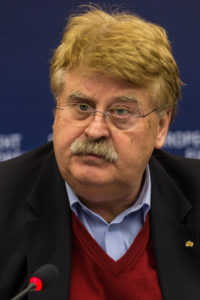Interview with EU affairs veteran Elmar Brok on the enlargement and reform of the European Union.

Press conference Strasbourg European Parliament 03 February 2014. © Claude Truong-Ngoc / Wikimedia Commons
Elmar Brok is a German politician who served as a Member of the European Parliament (MEP) from 1980 until 2019.
He was serving as chairman of the European Parliament Committee on Foreign Affairs from 1999–2007, and again from 2012-2017. He is a member of the CDU, which is part of the European People’s Party.
An MEP from 1980 until 2019, Brok held many leadership positions in German and European politics. As a member of the Convention on the Constitution for Europe and in the Committee on Constitutional Affairs, Brok is widely credited with contributing crucially to the Constitution of the European Union. He is also a former President of the Union of European Federalists (UEF).
Mr. Brok, EU enlargement was not exactly a key topic in the past few years, but now seems to come back. Now, Ukraine and Moldova were granted candidate status at the EUCO summit…
Brok: … And rightly so, especially for Ukraine, because it should be made absolutely clear that Russia cannot use Ukraine as a negotiation chip.
Do you believe that at the end of this process EU accession of Ukraine could eventually still be vetoed by one of the existing member countries in order to extract something in return?
I’m not sure, there is always the possibility of a veto. That is one of the reasons why I am against vetoes. That has to do with enlargement. If we have let’s say 36 EU members, i.e., the current ones plus those from the Western Balkans and Ukraine, Moldova, and Georgia, maintaining the veto power would mean the end of the European Union.
Will countries give up their veto?
I took part both in the constitutional convention and the summits where the treaties of Amsterdam, Nice, and Lisbon were negotiated. Even then there was a need to deepen the Union in order to make enlargement possible. Now, we need to go further. This means qualified majority voting (QMV), including on foreign and defense policy. The decision-making process of the EU is of the utmost importance. If one country of the 36 were able to veto sanctions, for instance, it would be ridiculous as we see these days.
What about the accession of new countries? Maybe “unanimity minus one” could be a principle?
I think that during the transition period it can be “minus one”, but that should not become the norm. We need decision-making power in the EU so that we can be effective. Where the EU uses qualified-majority voting, as on matters concerning its internal market, it is rather successful. Without QMV there would be no internal market. Some countries are fearing that using the QMV in foreign policy there will be centrifugal forces. Why? If it’s successful in the internal market, then it should be successful in other areas as well.
The EU has brought together all countries around one table – smaller and bigger ones. In the past, for centuries four or five powers in Europe decided on peace and frontiers. The era should not come back. Yet if the EU cannot make decisions in foreign, security, and defense policy then I fear the big countries will form a new club – there are already signs of this. That’s why I believe that the QMV is of the utmost importance for the future of the EU.
And what about Macron’s proposal for a two-tier club? Is it going to work?
The French have often thought about Europe being divided into two parts. Look, if you build a new entity that is political and is outside the EU and its legal framework, you have two European Unions. Building a new intergovernmental political union will not bring these countries closer, it will be an alibi for not letting them into the EU. Most of these countries are already in NATO, we cooperate politically with them. But could such an international body decide on sanctions in foreign and security policy if needed? So, I believe it should be the other way around – move the countries closer to the EU by developing stronger economic ties.
Many experts and decision-makers were critical of Macron’s idea and said it was a ‘trap’ for these countries…
I absolutely agree with that view.
So, what you are saying is first build economic ties and then political ones?
Why not move the Western Balkans countries, Ukraine, and Moldova closer to the EU by signing an association agreement, a free trade agreement similar to the European Economic Area (EEA)? What about the citizens of those countries? When will they see real progress? It is one of the mistakes, especially by making the countries of the Western Balkans wait so long. If citizens there cannot see progress in their social or economic situation, their enthusiasm to join the EU will be waning.
Is the EU’s credibility in the Western Balkans at stake?
First, we need to see what each of these countries is doing. The situation of accession of Bosnia and Herzegovina is not entirely the EU’s fault. There, you have three entities that are not ready to come to a joint conclusion in order to make their country work. That is their own responsibility. If Serbia and Kosovo cannot come to terms and solve their problems, can we make them members of the EU? I would not like to have that sort of problems inside the EU. On the other hand, I must say that the EU hasn’t always been clear with these countries. Every annual progress reports was telling that there was real progress even if there was not any progress at all.
What about North Macedonia, a NATO member country that is currently being vetoed by Bulgaria?
I must say that the present behavior of Bulgaria is not understood by me. If Bulgaria were not vetoing it, North Macedonia would start negotiations with the EU – which is right, after its agreement with Greece. We have here a situation where one country, Bulgaria, is already inside the EU and the other, North Macedonia, is not. Therefore, the country that is inside has an unfair advantage. I think that the country that is inside the EU should not use its advantage in such a way. Certain new EU member countries have not understood what the EU is all about. It’s not a vehicle to change things, to change borders. The EU is about coming to an agreement that makes it irrelevant what ethnical, cultural, and language background a country has and where its frontiers are. After World War II, Germany and France agreed not to change their mutual border anymore.
But also, to make the border between them unimportant. That is the European Union!
Do all 27 member states really want the countries from the Western Balkans to join? There is some weariness, look at the case of Turkey for example.
You cannot compare these two questions. Turkey has been moving away from European values over the last 20 years. Turkey is as far away from the EU today as it was in, say, 1999. If the country does not fulfill the political conditions – i.e. being a full democracy, applying the rule of law, etc. – it cannot become a member of the EU.
Let’s turn to the Conference on the Future of Europe. What should be done, treaty changes, or better use of existing powers?
It’s up to the European Council if they follow up on the proposal by the Parliament to get another Convention set up. Treaty change needs negotiations, a convention or an intergovernmental conference, and a ratification process. That can take more than six years. In some instances, we just don’t have that time. Hence, we should use the possibilities of the existing treaties, i.e. qualified majority voting as far as it is possible for foreign and security policy.
In the end, some aspects of the treaties probably do need to be changed, that should be done in a convention and intergovernmental conference but in a limited way in order to have results immediately.
On which issues do you see a need for reform?
I give you an example – apart from foreign policy: We need to have a look at taxation. We want to have a level playing field between SMEs and large foreign companies – Google, Microsoft, Apple, Amazon, and so on – we must find a way for the latter to pay the same taxes in Europe that European companies pay.
So, taxation would be one of the reform areas?
Aspects of taxation. SMEs and citizens have to pay taxes in order to finance infrastructure, schools, and kindergartens. We need to have a joint policy towards companies who earn a lot of money here in the EU but do not pay their dues here. For instance, Amazon doesn’t pay a penny here. That’s not okay and we need certain instruments for a just and fair economic situation.
Another big discussion is on Sovereignty v. ‘Ever Closer Union’? Is it time for more sovereignty of nation states, or are we on a way to a more closely integrated EU?
I think there are lots of challenges but we are on the path of Ever Closer Union. Member states are always masters of the treaties. No one is against an internal market where everyone enjoys and respects the same laws, because otherwise, it won’t exist. But it’s always a compromise. Smaller countries like Hungary need the EU more than the bigger countries. In this global order, a country like Hungary cannot survive outside of the EU. If you have independent European countries, what they are going to do when faced by China, Russia, or the US?
Yet populists in France and many other countries are riding high on a wave of anti-EU populism, just look at France…
There is still a majority in France that is pro-European. We have to be bolder and ask people like Jean-Luc Mélenchon what it is they want to do alone. What does he want to do without the EU? Too many national governments use the mantra – if it’s raining then it was Brussels, if the sun is shining it was done by Paris and Berlin. That is a big mistake. Sometimes governments find a scapegoat for their own incompetence in the EU.
Is there an area where we need ‘less Europe’?
Let’s use agriculture as an example. Whether every part of it must be decided in Brussels can be debated. But while in many parts of the world there are food crises, in the EU, there is no such danger…
Coming back to Russia’s war in Ukraine, do you think the EU is doing enough in this case? Should it be braver, bolder, and innovative in this vastly different international environment?
First, we have countries that are not doing enough, including my own country. Germany made big mistakes in energy issues, and Nord Stream is the symbol of it. Many in Berlin didn’t listen to other Central and Eastern European countries. However, the EU is still very weak cause we have no common defense policy until now. While there are 170 different types of weapons systems in Europe, the US has only 25. We have 15 different platforms for tanks – the US only one. The member states of EU spend 280 billion euros per year on defense – four times as much as Russia – but everyone does it for themselves. We need more cooperation, development, research, production, and procurement. Companies in Germany assemble tanks hand by hand which is ridiculously expensive. We need to have joint standards in order to have mass production. This need to be understood in Germany but also in other countries.
Polish former Foreign Minister Witold Waszczykowski said Germany was playing a very bad role in EU foreign policy and it cannot lead the EU. Do you agree?
No. If you have proper decision-making procedures, things can be done jointly. Germany doesn’t want to lead Europe alone – there are lots of reasons for that, namely history. So leadership needs to be broadened – just like Macron, Scholz, and Draghi were in Ukraine recently, together with the Romanian President Iohannis. But I wondered why the Polish prime minister was not part of the delegation. Countries need to have the feeling that they play a role and have a say. Trust between the participants is very important. We have to understand that throughout the history countries like Poland have never been taken seriously by the big powers in Europe. Poland was divided three times in the 19th century. And after 1939 again by Soviet Union/Russia and Germany.
Some of these countries believe that they are not taken seriously and I have a feeling that in Germany also there is little sensitivity to this situation. Poland, the Baltics, and other states should feel secure that the big countries don’t play with Russia over their heads. It was not nice for Poland to sit between Germany and Russia over the centuries.
There was a moment I will never forget. In 1990, before the German unification, I spoke to the then-first democratically elected Polish Foreign Minister Krzysztof Skubiszewski. I asked him: What is your political goal, what do you want to achieve? He said, “We want to join EU and NATO to make the Germans defend us against the Russians”. A very wise statement that I will never forget. Yet I am also not sure that we are fit to fulfill what Skubiszewski said that day. Unification of Europe meant freedom and peace – that should be the overall argument.
The interview with the former MEP and Chair of the European Parliament Foreign Affairs Committee was conducted by Michael Thaidigsmann and Nenad Jurdana.






